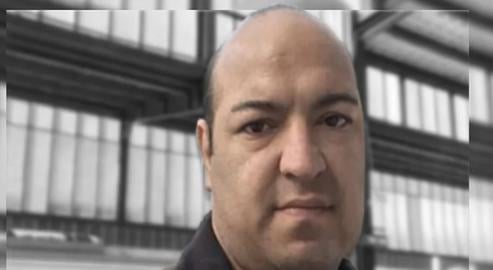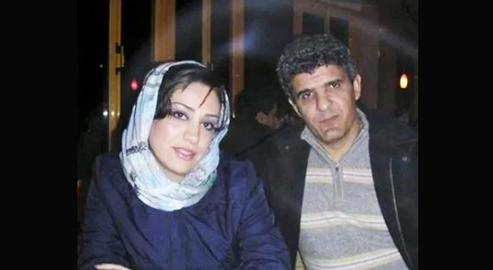Sasan Niknafs, a political prisoner who was serving an eight-year sentence in Greater Tehran Penitentiary for his civil activism, has died behind bars.
The news was announced on Monday, June 7 by fellow activist Hossein Ronaghi. In a post on Instagram, Ronaghi said: “Sasan Niknafs has been killed in prison. This was not a normal death. When you jail an innocent person for his beliefs and opposition, and he dies, this death is not an ordinary death; this is murder."
Niknafs’ lawyer has since confirmed the death, followed eventually by the judiciary. An hour before Ronaghi’s post, human rights campaigner Narges Mohammadi had also told followers on her Instagram page that the father-of-two had been taken to hospital the previous evening.
“No one, not even his family, knows about his condition,” she said. “His inmates have described his condition during the transfer to the hospital as very worrying."
Sasan had endured difficult conditions for 18 months, struggling with depression and repeated suicide attempts behind bars. Despite having a letter warning he was not fit for prison, he was kept there nonetheless, and was treated by prison medical staff at least four times before he was taken to an unnamed hospital. There or before his arrival, he died without his family aware or around him.
Family Kept in the Dark for Over Two Days
Sasan Niknafs was arrested in August 2019 along with five other people by members of the Revolutionary Guards’ intelligence agency. He was later sentenced by Branch 15 of the Revolutionary Court of Tehran, presided over by Judge Abolghasem Salavati, to eight years in prison on charges of "conspiracy and collusion against national security", “propaganda against the regime” and “insulting the Leader”.
This was upheld by Branch 36 of the Tehran Court of Appeal, presided over by Judge Zargar, in April 2020. The charges against Sasan related to articles he had posted on Instagram in support of Reza Pahlavi and criticizing the Islamic Republic, as well as his having lambasted the Iranian leadership for putting political slogans on banknotes.
Recently the Human Rights Organization of Iran raised the alarm about his deteriorating condition behind bars, reporting that he was suffering from depression and self-harming. The prisoner, they warned, was being denied access to medical care.
On Monday Ali Sharifzadeh, Sasan Niknafs’ lawyer, said on Twitter that his client’s medical file clearly stated that he could not withstand a lengthy prison sentence. But senior officials at Greater Tehran Penitentiary had apparently chosen to ignore this.
In an interview with IranWire, Sharifzadegan added that the judiciary was now trying to portray the incident as a “suicide”, perhaps in the knowledge that some human rights organizations now hold the Islamic Republic responsible for Sasan’s death.
The tragedy has come months after Behnam Mahjoubi, an imprisoned Gonabadi dervish, also died behind bars because of a toxic combination of torture and woeful medical negligence. Behnam, too, was in prison despite having a doctor’s note saying that he could not tolerate it. He was denied his medication for a serious neurological problem, taken to Loghman Hospital and injected with unknown drugs, before slipping into a coma and dying in hospital.
By the time Sasan died, his family had been unaware of his whereabouts for a full 72 hours. Ali Sharifzadeh told IranWire: “They didn’t even tell us which hospital it was; some said Imam Khomeini, others Loghman. Some of the information even indicated that he actually died in the prison medical center after they failed to resuscitate him.”
On the morning of Monday, June 7, Sasan’s mother contacted the assistant prosecutor in charge of Greater Tehran Penitentiary to ask about her son’s condition. She was told only that she “would be informed”.
What Happened to Sasan Niknafs?
Prison medical officials had previously sent Sasan for treatment for diabetes and liver disease two months into his incarceration. A week after that, his request for medical leave was rejected and he was informed that he could safely serve his sentence under medical supervision.
Sharifzadeh notes that his client also had a history of severe depression and had seemingly attempted suicide on more than one occasion in prison. “During a meeting with him, I saw Sasan's hand had been cut with a knife and observed that he was self-harming."
What drugs were given to this prisoner in jail, or how his diabetes was treated if at all, are utterly unknown to Sharifzadeh and Sasan’s family. Just last week Sasan was sent for another medical examination but for unknown reasons it never took place, and he was brought back to prison. When he arrived he was taken into quarantine. There, he suffered an apparent seizure.
Sharifzadeh told IranWire that at about 7.30am on the Friday morning, Sasan was transferred to the prison health center with blood flowing from his nose and mouth. His family were kept in the dark about what happened to him after that.
But Ahmadreza Haeri, a human rights activist and former inmate of Sasan’s at Greater Tehran Penitentiary, told IranWire that two inmates who were with him on Friday had said no decision was taken about what to do with him until at least 12 noon. They were then told the ambulance to take him to hospital was not ready. Finally, Sasan was conveyed to hospital at 4pm.
Between Friday afternoon and Monday morning, follow-up queries by Sasan’s family went unanswered. His elderly mother and two young daughters were left anxiously waiting for news at home, and even on Monday heard the rumors of his death before it was officially confirmed.
Prison Officials React with Nonchalance to Another Avoidable Death
On Monday the judiciary’s official news agency, Mizan, issued a belated statement in which the Tehran Province General Directorate of Prisons sought to absolve itself of all responsibility for Sasan’s death under its care.
“During a conversation that [Sasan Niknafs] had with the doctor,” it claimed, “he said he had taken several pills from one of the prisoners and after taking them, his condition deteriorated. He had a seizure again, and according to the doctor's diagnosis, the prisoner was rushed to Firouzabadi Hospital immediately at 5.20pm, where he eventually died."
The statement echoed that issued after the death of Behnam Mahjoubi. Then, prison officials claimed that initial investigations by the Tehran General Directorate “showed” that Mahjoubi had been poisoned by drug overdose. No further details were issued.
Human rights activists have accordingly blamed the Islamic Republic for the deaths of both Behnam and Sasan. "Ebrahim Raeesi, the head of the judiciary, and Ali Khamenei, the leader of the Islamic Republic, are responsible for the detentions, harassment against, and deaths of political prisoners and prisoners of conscience," said Mahmoud Amiri Moghaddam, director of Iran Huan Rights.
"Depriving prisoners of their right to medical treatment is an example of torture. We have repeatedly called on the international community to pay more attention to this issue, especially in the wake of Behnam Mahjoubi's death. The officials of the Islamic Republic must be held accountable for the death of Sasan Niknafs."
The Islamic Republic has not only failed to apologize for deaths in custody, but has poured salt in the wounds in its public handling of the cases. Shortly after Behnam Mahjoubi’s death, Musa Ghazanfar-Abadi, head of the Iranian parliament's Legal and Judicial Committee, also callously observed of the case: "Life is in the hands of God.”
Mahmoud Masoumi, a human rights activist and researcher for the non-profit Iran Prison Atlas, told IranWire: “For some reason, this prisoner’s transfer to hospital happened too late. In addition, Sasan's inmates have also affirmed that he was clearly incapable of enduring imprisonment."
Political and ideological prisoners’ medical needs go unmet more frequently than those of ordinary prisoners. Even if a qualified physician confirms they cannot tolerate a long period in jail, it is the assistant prosecutor who makes a final decision on their fate. This is currently Amir Vaziri: a relatively junior prosecutor who has a track record of turning a blind eye to political prisoners’ health needs, if he has acknowledged them at all.
Sasan Niknafs was transferred to Greater Tehran Penitentiary in August 2020, after the Tehran Court of Appeal upheld his sentence. Like others before him, the story of what happened to him there remains unfinished. But it appears that as with Behnam Mahjoubi, the judicial authorities walked Sasan Niknafs to his death.
Related coverage:
Assistant Prosecutor is Accused of Killing Dervish Prisoner
Medical Negligence in Prisons Violates Iran's Domestic Laws
Filmmaker's Appeal Quashed as Authorities Target Wife and Son
Young Political Prisoner's Life Hangs in the Balance in Tehran
visit the accountability section
In this section of Iran Wire, you can contact the officials and launch your campaign for various problems

























comments